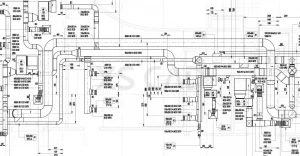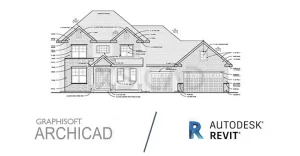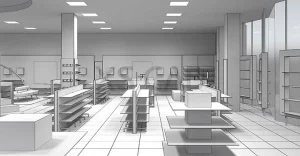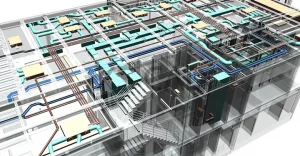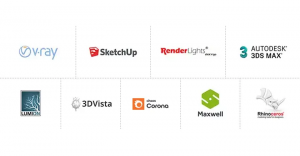Future-proof Your Retail Outlet: The Ultimate Guide to MEES Compliance & Energy-efficient Design in the UK
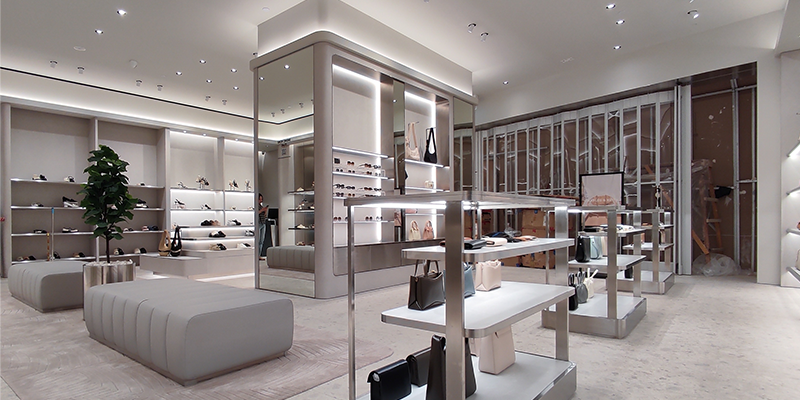
Embracing the transformation sweeping through the UK retail sector as sustainability takes centrestage may be unavoidable. Driving this change is the Minimum Energy Efficiency Standard (MEES) – a mandatory regulation designed to enhance the energy performance of commercial and retail properties across England and Wales. Failure to comply doesn’t just risk hefty fines; it could put your entire investment at stake. Expert M&E CAD drafting services and electrical design services by experienced M&E design consultants can help solve this challenge.
Currently, all commercial properties must meet a minimum Energy Performance Certificate (EPC) rating of E. However, by 2030, this requirement will rise dramatically to an EPC rating of B – a major leap that signals the future of greener, more sustainable retail spaces through the use of trusted.M&E design engineering and mechanical engineering design services.
Why MEES Compliance Matters
Achieving MEES compliance isn’t just about avoiding penalties. It’s a smart, forward-thinking move that delivers several major advantages:
Non-compliance could lead to fines ranging from £5,000 to £150,000, depending on the property’s rateable value and breach duration – with potential sector-wide losses of over £1 billion annually.
The Challenges of MEES Compliance
Despite its benefits, reaching MEES compliance can be challenging:
However, with the right strategy, expert advice, accurate mechanical 3D modelling services, MEP modelling, retail store design and retail space design services, these challenges can be turned into opportunities for long-term gains.
Top Tips for Achieving Cost-Effective MEES Compliance
1. Conduct Thorough Energy Audits
An energy audit is the essential first step towards compliance. It provides a clear snapshot of your building’s current performance and pinpoints inefficiencies.
In fact, UK government data shows that businesses implementing audit recommendations under the Energy Savings Opportunity Scheme (ESOS) saved an average of 5,000 MWh annually – with 80% of savings achieved through measures costing less than £250,000. Follow-up audits often unlock even more savings, typically an additional 5-15%.
2. Implement Targeted Upgrades
Focusing on specific, high-impact upgrades can significantly boost your EPC rating:
3. Leverage Renewable Energy
Incorporating renewable energy can substantially improve your building’s sustainability credentials:
Facilities managers should carefully assess factors such as roof space, structural capacity and energy demands to determine the best renewable options.
4. Embrace Smart Technology
Smart building technologies, such as Energy Management Systems (EMS), offer real-time monitoring and predictive maintenance. These systems help facilities managers quickly spot inefficiencies, optimise energy use and plan targeted upgrades.
By tracking energy trends over time and adjusting operations dynamically (for example, modifying HVAC settings based on occupancy), smart technologies support sustained energy savings, enhanced tenant comfort and continued MEES compliance.
How Axium Global Can Help
Navigating the path to MEES compliance requires a proactive, expert-led approach utilising flexible and versatile mechanical design services, M&E services, engineering design services and modern retail building design. Axium Global provides:
The Road to a Greener Future
MEES regulations represent a significant step towards creating sustainable, future-ready retail spaces. While achieving compliance may seem complex, it’s a worthwhile investment that enhances property value, reduces operational costs and strengthens ESG performance.
By acting early – and with expert support – retailers and landlords can meet MEES requirements and also transform their properties into greener, more resilient and more profitable assets for the future.
Axium Global provides expert M&E CAD drafting services and mechanical engineering design services for leading global M&E design consultants. Our range of services include electrical design services, mechanical 3D modelling services, MEP modelling, retail store design, retail space design, mechanical design services, M&E services, engineering design services, modern retail building design and other M&E design engineering services. We also provide design support services by creating 3D visualisation, rendered images, 3D modelling and 3D walk-throughs by using Revit, 3ds Max, V-Ray, Adobe Photoshop and After Effects, Illustrator and BIM Collaboration Pro for cloud collaboration.


